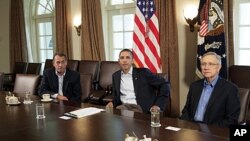Public-opinion polls show most Americans want Democrats and Republicans in Washington to reach a compromise to raise the nation’s debt limit as next Tuesday’s deadline approaches to prevent the first-ever government debt default. But both sides in the debt battle claim that public opinion is on their side.
Around the country, Americans are getting weary of the polarized debate in Washington over raising the debt ceiling. They are also increasingly concerned about the predicted negative economic consequences of default if the standoff continues.
A sampling of public opinion shows growing impatience with the inability of Washington politicians to find a solution.
“Whether you are far to the right or far to the left, it seems like it is the same shenanigans over and over again. They need to fix whatever it is and let us move forward,” one person said.
“The only thing that they are wrong about is that they do not want to move towards agreement. That is the single most important thing that has to happen right now,” said one woman.
The latest Washington Post/ABC News poll found 80 percent of those surveyed either angry or dissatisfied with events in Washington. Several polls have also found that a majority of Americans favor a compromise of a combination of spending cuts and tax increases to reduce the deficit.
For now, the polls also show that voters blame Republicans more than President Obama for a lack of willingness to compromise on the debt issue.
President Obama has seized on those numbers to argue that it is time for House Republicans elected with backing from the conservative Tea Party movement to show more willingness to compromise.
“They are fed up with a town where compromise has become a dirty word. They see leaders who can not seem to come together and do what it takes to make life just a little bit better for ordinary Americans. They are offended by that. And they should be,” Obama said.
Many of the new House Republicans elected last year with Tea Party support believe they were sent to Washington to cut the deficit, reduce the size of government, and resist any compromises that in their view undermine those goals.
Florida Representative Allen West is a favorite of Tea Party activists and a recent guest on VOA’s Press Conference USA program.
“If you want to reform a drug addict, you do not give him more drugs. If you want to reform and rehabilitate the federal government, you do not need to give us more money. We do not tackle these issues. We just continue to play games with the American people,” West said.
West and other Republicans cite polls that show Americans remain committed to cutting the deficit, and they are being urged on by Tea Party activists like this woman in Virginia.
“Stay on your ground. We have got to cut the budget!”
That political pressure from conservatives has in turn made it more difficult for Republican congressional leaders to find common ground with the White House and congressional Democrats who favor a mix of budget cuts and tax hikes to reduce the deficit.
This is the Republican Speaker of the House, Representative John Boehner of Ohio:
“Where most American business make the hard choices to pay their bills and live within their means, in Washington more spending and more debt is business as usual. I have got news for Washington - those days are over,” Boehner said.
Political analysts see public opinion playing an important, but complicated role in the debt debate.
Mark Penn was an important adviser to former President Bill Clinton in the 1990’s and to Hillary Clinton in her 2008 presidential campaign.
“Americans want to see less debt. They want to see the deficit tackled. They also want to see Washington come together and start to solve problems," Penn said.
Penn also says that voters could take their out anger on both sides in next year’s presidential and congressional elections if a compromise is not reached in time to avoid the government defaulting on its debt obligations next week.
“We have gotten way off fiscal course, and so they want to see everyone get together. And if they fail to get together, I think that in the mood they are, those who fail to come together to an agreement and who cause America any damage from within on the debt ceiling are going to pay a very high political price," Penn said.
The political stakes are enormous for both sides. Republicans want to be seen as carrying out the wish of their conservative base by pressing for deep cuts in government spending.
President Obama has angered some Democrats with his willingness to agree to substantial cuts in government spending, but hopes his stance will win over centrist voters in next year’s presidential election.
Public Opinion Complicates US Debt Debate




